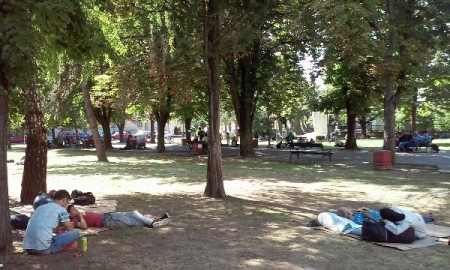 On the officials and staff meeting of the Provincial Protector of Ctitzens - Ombudsman institution, held on 9 Decembar 2016, the Provincial Ombudsman Collegium was established. Its members are the Provincial Protector of Ctitzens - Ombudsman, his deputies, advisors and associates. The agenda of its first meeting was the future work of the institution's and its plan of activites.
On the officials and staff meeting of the Provincial Protector of Ctitzens - Ombudsman institution, held on 9 Decembar 2016, the Provincial Ombudsman Collegium was established. Its members are the Provincial Protector of Ctitzens - Ombudsman, his deputies, advisors and associates. The agenda of its first meeting was the future work of the institution's and its plan of activites.
The collegium will consider and discuss the most complex citizens' complaints and issues the Provincial Protector of Ctitzens - Ombudsman institution faces in its work, including professional education of the Collegium members, as well as other operational issues.
Law School Students of the University of Novi Sad Attending a Training with the Provincial Ombudsman
 Prof. Zoran S. Pavlović, the Provincial Protector of Citizens - Ombudsman, welcomed the junior, aka 3rd year students of the Univeristy of Novi Sad Law School to attend a training with the Provincial Ombudsman insititution over the course of the next two weeks.
Prof. Zoran S. Pavlović, the Provincial Protector of Citizens - Ombudsman, welcomed the junior, aka 3rd year students of the Univeristy of Novi Sad Law School to attend a training with the Provincial Ombudsman insititution over the course of the next two weeks.
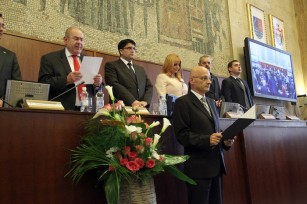 The new Provincial Protector of Citizens - Ombudsman of the Autonomus Province of Vojvodina is Prof. Zoran S. Pavlović, SJD, Associat Professor with the Economics and Judiciary Law Faculty of the Economics Academy Univerisity in Novi Sad, Serbia. He was elected new Provincial Ombudsman on today's session of the Assembly of the Autonomous Province of Vojvodina for the term of six years. The election of Prof. Zoran S. Pavlović, SJD, was supported by over two-third of the MPs, which is a census complying with the provisions of the Provincial Assembly Decision on the Provincial Protector of Citizens - Ombudsman concerning election of candidates for this post.
The new Provincial Protector of Citizens - Ombudsman of the Autonomus Province of Vojvodina is Prof. Zoran S. Pavlović, SJD, Associat Professor with the Economics and Judiciary Law Faculty of the Economics Academy Univerisity in Novi Sad, Serbia. He was elected new Provincial Ombudsman on today's session of the Assembly of the Autonomous Province of Vojvodina for the term of six years. The election of Prof. Zoran S. Pavlović, SJD, was supported by over two-third of the MPs, which is a census complying with the provisions of the Provincial Assembly Decision on the Provincial Protector of Citizens - Ombudsman concerning election of candidates for this post.
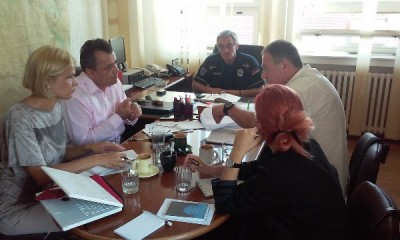 Due to the massive increase in the number of migrants flocking to the north of the Autonomous Province of Vojvodina, Serbia, Stevan Arambasic, Deputy Ombudsman to the Provincial Protector of Citizens - Ombudsman visited Kanjiza yesterday.
Due to the massive increase in the number of migrants flocking to the north of the Autonomous Province of Vojvodina, Serbia, Stevan Arambasic, Deputy Ombudsman to the Provincial Protector of Citizens - Ombudsman visited Kanjiza yesterday.
The aim of the visit was to establish to what extent are the local self-government and other authorities in charge are able to cope with the situation and provide for exercise and protection of migrants' rights granted by the international and national human rights legislation provisions. Deputy Arambasic focused especially on the exercise of their right to legal aid and interpretation, as well as that to healthcare. He talked both with the migrants, as well as the representatives of the local police, primary healthcare unit, Red Cross, welfare center and administration.
The police said that 90 percent of migrants were coming from Syria and that most of them, usually accompanied by their family members, claimed to be fleeing from war, aka military duty, and heading to Germany or Sweden. Kanjiza is a temporary target destination of 700-1,000 migrants daily, who usually come in late afternoons or evenings. They spend less than 12 hours in the town, waiting for the night when organized groups of even several hundreds of them are heading towards the Hungarian border. The fact that they are heading down the middle of streets and roads is a huge safety risk both for the migrants and vehicles. since the beginning of 2015, a total of 6,072 persons on their way towards the EU have been officially processed by the police in Kanjiza, 2,991 of them from the readmission proceedings. Both the prosecutors office and the border police are involved in handling migrant issues. The families are not separated during the proceedings. Each and every proceeding based on the Law on Foreigners is registered as a separate measure, so in this respect the relevant authorities in Kanjiza have implemented a total of 21,126 measures concerning migrants. For the sake of comparison, this year's total of such measures in Serbia has been 74,086, whereas last year in Kanjiza there were 1,278 persons handled on the ground of readmission or their foreigner status, with a total of 868 relevant measures implemented.
Local authorities, along with the other institutions and organizations in charge Deputy Arambasic visited, expressed its concern primarily for two reasons. Construction of a fence at the Hungarian border will slow down the crossing of migrants into this country and increase the number of those staying in the settlements close to the border for a longer time. This could cause further tension between the local population and migrants, which could, in turn, lead to deterioration of the safety situation in the northernmost municipalities in Vojvodina. Regardless of the fact that these people are not staying in the settlements longer than 24 hours, residents of Kanjiza perceive their presence a major, constant threat and disturbance of their everyday life and even business. Kanjiza is a tourist resort, with a renowned spa bath, but ever since the migrants started flocking the town this activity has practically stopped.
The citizens of Kanjiza are most concerned by the fact that the town has no public toilet. The consequences of unsanitary human excrements disposal in more secluded streets and parks in the town are potentially alarming from healthcare aspect. Since jurisdiction, authority and capabilities of the local self-governments in such situations are relatively limited, with available funds and human resources in Kanjiza nearing availability limits, a major cause of concern is also the forthcoming winter and the fact that migrants need an adequate basic dwelling and sanitation facilites.
Since last week, the authorities in charge have had the assistance of two interpreters for Arabic language provided by an international aid and relief agency. The municipality has a local Migration Council, while the police should start running a round-the-clock local migration office providing the arriving people with legal and humanitarian aid, interpretation, healthcare and welfare services. Deputy Arambasic had a chance to visit the prospective migrants' drop-in unit and shelter site at the fairground in Kanjiza, the creation of which has only just begun.
The management of the Welfare Center in Kanjiza said that four professionals handling all work at the center cannot cope adequately with the usual workload concerning other citizens, let alone additional migrants related work. Ever since migrants started arriving, the misdemeanors court issued 248 rulings in proceedings concerning migrating minors without representatives of the welfare center participating in them in the capacity of an officially appointed custodian. In such cases, the welfare center is doing its best to handle further proceedings with maximum observation of all - often even contradictory - regulations in force.
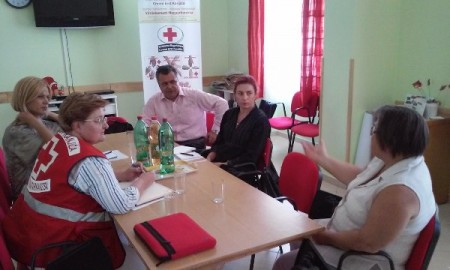 The local Red Cross claims that the humanitarian situation in Kanjiza is still not alarming. Confirming that all authorities in charge are doing their best to provide for undisturbed everyday life in all 12 settlements of the Kanjiza Municipality, the Red Cross holds that the current situation is equally a result of both the negligence of the local community and the increased number of arriving migrants. As example of their claim is the fact that there is no adequate public sanitation facility, including free toilets and potable water containers easily accessible to migrants, wither in the center of the town of any other suitable location.
The local Red Cross claims that the humanitarian situation in Kanjiza is still not alarming. Confirming that all authorities in charge are doing their best to provide for undisturbed everyday life in all 12 settlements of the Kanjiza Municipality, the Red Cross holds that the current situation is equally a result of both the negligence of the local community and the increased number of arriving migrants. As example of their claim is the fact that there is no adequate public sanitation facility, including free toilets and potable water containers easily accessible to migrants, wither in the center of the town of any other suitable location.
Migrants address the local primary heathcare unit usually in the evenings. They mostly complain about leg pain and exhaustion. Those in need of medication are issued prescriptions if necessary, but they have to buy their own medicines. There have been no major health concerns in this population so far. Once handled, a copy of the form with the data about the medical handling of migrants is sent to other authorities in charge, along with a photocopy of any existing medical documentation the migrants may have with them. Along with the lack of any immunisation data with the migrant population, a major medical issue is the limited capacity and resources of the local primary healthcare units, as well as hospitals they refer their patients to.
Deputy Arambasic visited also the fairground with the to-be migrants' drop-in unit and shelter. There were also the representatives of the Refugee Commissioner engagen in the Presevo drop-in center in the south of Serbia, who came to assist with the establishment of a similar facility in Kanjiza. In this wire-fenced location at the entrance to the settlement from the direction of Horgos, there is so far a big tent potentially seating around 300 people temporarily, another, smaller one that could be used as a mediacal unit, as well as an old container with two toilets. The local authorities claim this drop-in unit and shelter will be functional as soon as possible, with potable water, proper sanitation facilities and connection to the town center. All institutions in charge in Kanjiza claim their mutual collaboration is excellent, addressing also the provincial and state authorities to do everything in their jurisdiction in order to prevent the migrants related situation in the northern Serbian municipalities bordering Hungary becoming a major humanitarian crisis.
Migrants who talked to Deputy Arambasic pointed out that they had had no bad experience whatsoever while in Serbia, praising at the same time the conduct of all representatives of state authorities and institutions, as well as citizens they came into contact with.
'We are fleeing from war. I was no human being until I crossed the Arabian Sea. Only then did a woman give me a pair of shoes because I was barefoot. The closer we are to Europe, the more we feel like humans because we are being treated like humans in your country. We're off to my brother's place in Germany,' said one of the migrants in the town park in Kanjiza, pointing to his six-member family with two small children and two teenage boys.
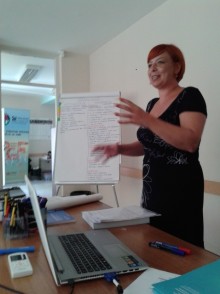 On 28 July, Novi Sad was the venue of the third module of the VET4 Mediation with Roma intercultural mediators' training concerning healthcare, housing, employment and education. Around 20 intercultural mediators took part in the training and had a chance to talk to Eva Vukasinovic, National Minorities Protection Deputy Ombudswoman to the Provicinsial Protector of Citizens - Ombudsman (PPCO) and learn more about the jurisdiction and work of this institution. Deputy Vukasinovic introduced them to the ways and proceedings they can utilize the ombudsman human rights protection mechanism, esp. as related to housing issues.
On 28 July, Novi Sad was the venue of the third module of the VET4 Mediation with Roma intercultural mediators' training concerning healthcare, housing, employment and education. Around 20 intercultural mediators took part in the training and had a chance to talk to Eva Vukasinovic, National Minorities Protection Deputy Ombudswoman to the Provicinsial Protector of Citizens - Ombudsman (PPCO) and learn more about the jurisdiction and work of this institution. Deputy Vukasinovic introduced them to the ways and proceedings they can utilize the ombudsman human rights protection mechanism, esp. as related to housing issues.
The intercultural mediators' training is a part of the international VET4 Mediation with Roma project supported by the Lifelong Learning programme of the European Commission and implemented in Spain, Belgium, Italy, Romania and Serbia. The PPCO supported this project, along with the Roma Inclusion Office of the Vojvodina Government, the PGF instrument, Open Society Foundation and the Know-How Center from Novi Sad.
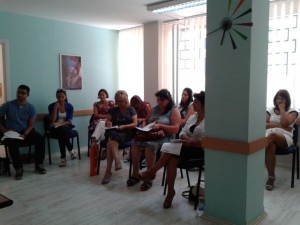 The project aims at promoting mediation and mediators' empowerment, as well as that of Roma women and men, through training and issuing a mediator's certificate in order to instigate engagement of intercultural mediators in local communities, esp. in those with a significant proportion of Roma population.
The project aims at promoting mediation and mediators' empowerment, as well as that of Roma women and men, through training and issuing a mediator's certificate in order to instigate engagement of intercultural mediators in local communities, esp. in those with a significant proportion of Roma population.
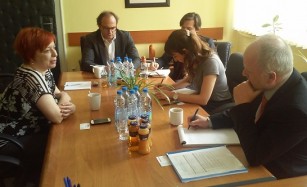 The aim of today's visit of the OSCE High Commissioner on National Minorities delegation to the provincial public services and institutuions was to discuss national minority rights protection issues. The host of the meeting in the Provincial Protector of Citizens - Ombudsman's (PPCO) Office was Eva Vukasinovic, the National Minority Rights Protection Deputy Ombudswoman.
The aim of today's visit of the OSCE High Commissioner on National Minorities delegation to the provincial public services and institutuions was to discuss national minority rights protection issues. The host of the meeting in the Provincial Protector of Citizens - Ombudsman's (PPCO) Office was Eva Vukasinovic, the National Minority Rights Protection Deputy Ombudswoman.
The High Commissioner's representatives came to Vojvodina, Serbia to learn about the implementation and functioning of the human rights protection legal and institutional framework on all levels of administration. Visits to the relevant provincial and national institutions are expected to provide input for creation of activities concerning revision of the existing and creation of a new, more efficient system of minority rights protection in the Kyrgyz Republic.
The discussion during the meeting concerned the state of minority rights in Vojvodina and Serbia, functioning of the National Minority Councils and proceedings of the PPCO in the minority rights field, esp. as related to official use of minority languages and script and education.
Members of the OSCE High Commissioner on National Minorities delegation were Christian Knust, Project Officer, and Andrei Khanzhin, Political Adviser, accompanied by Nenad Djurdjevic, Coordinator of the Ethnic Relations Forum from Belgrade.
 According to its authority to conduct research studies in order to gain insight into the state of human rights, identify issues and formulate recommendations aimed at human rights exercise, protection and advancement, the Provincial Protector of Citizens - Ombudsman (PPCO) conducted a research study on the level of minority languages use and conduct with the provincial authorities' employees. The particular focus of this study was to establish whether knowledge of a minority language in official use on the territory of the Autonomous Province of Vojvodina was a formal condition for employment in particular posts, as well as on the way the employees demonstrated, aka proved their language skills prior to employment.
According to its authority to conduct research studies in order to gain insight into the state of human rights, identify issues and formulate recommendations aimed at human rights exercise, protection and advancement, the Provincial Protector of Citizens - Ombudsman (PPCO) conducted a research study on the level of minority languages use and conduct with the provincial authorities' employees. The particular focus of this study was to establish whether knowledge of a minority language in official use on the territory of the Autonomous Province of Vojvodina was a formal condition for employment in particular posts, as well as on the way the employees demonstrated, aka proved their language skills prior to employment.
Upon summarizing the results, the PPCO sent official recommendations to all relevant provincial authorities aimed at advancing the state of affairs in the field of official use of minority languages and script used in public services in Vojvodina.
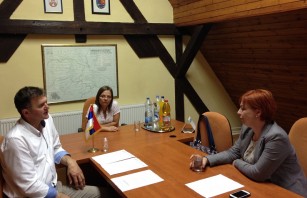 Last week, Eva Vukasinovic, the National Minority Rights Protection Deputy Ombudswoman, met with Presidents of five National Minority Councils. They discussed current issues relevant to each minority community specifically, as well as the ways its members hold that the Provincial Protector of Citizens - Ombudsman (PPCO) could contribute to the advancement of their personal and collective human rights exercise and protection.
Last week, Eva Vukasinovic, the National Minority Rights Protection Deputy Ombudswoman, met with Presidents of five National Minority Councils. They discussed current issues relevant to each minority community specifically, as well as the ways its members hold that the Provincial Protector of Citizens - Ombudsman (PPCO) could contribute to the advancement of their personal and collective human rights exercise and protection.
The fact that National Minority Councils (NMCs) are not recognized in other laws that concern minority rights exercise directly or indirectly is a key problem faced by the NMCs in their everyday work. Other issues discussed on these occasions were the experience concerning the last elections for new NMCs, along with the representation of women in them.
Based on its mandate, the PPCO has established cooperation with all NMCs the members of which live in the Autonomous Province of Vojvodina and monitored their work based on the provisions of the National Minority Councils Law. Detailed data on the exercise of the NMCs mandate during their first term have been published in the PPCO research study report „Four Years of the NMCs”.
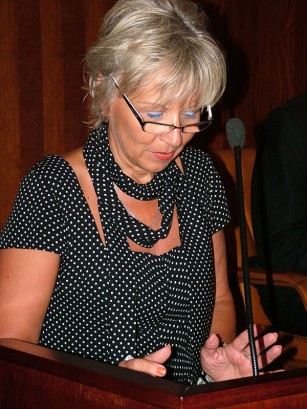 'Citizens are the focus of our work. We are trying to assist them, to point to the authorities' failures and mistakes, to prevent and eliminate the consequences of violations of regulations. This is why our work causes many problems to be resolved even during the proceedings and with no need for official recommendations,' said Aniko Muskinja Heinrich, the Provincial Ombudswoman, presenting the Provincial Protector of Citizens - Ombudsman (PPCO) 2014 Annual Report to the Parliament of Vojvodina yesterday.
'Citizens are the focus of our work. We are trying to assist them, to point to the authorities' failures and mistakes, to prevent and eliminate the consequences of violations of regulations. This is why our work causes many problems to be resolved even during the proceedings and with no need for official recommendations,' said Aniko Muskinja Heinrich, the Provincial Ombudswoman, presenting the Provincial Protector of Citizens - Ombudsman (PPCO) 2014 Annual Report to the Parliament of Vojvodina yesterday.
In her brief address to the MPs, the Provincial Ombudswoman pointed out that dissatisfied citizens addressing the Ombudsman rarely state which public authority specifically has violated their rights with its (non)action. In her opinion, citizens are not bound to know it, because it is up to the Ombudsman to assess which public authority has actually failed to do its work or acted contrary to the regulations. In her opinion, a more efficient operation of the PPCO could be achieved by passing a law regulating that a filed complaint would be handled according to the citizens' place of residence and the address of the public service within the local self-government complained about.
In the debate after her introductory address, the MPs expressed completely divergent opinions about the Report. While ones claimed it was good, clear and detailed, especially the research studies and the parts pertaining to national minority rights, others expressed their astonishment and resentment, especially with regard to its introductory remarks deemed too politicizing and full of random and untrue statements. The latter went as far as to claim the PPCO went out of the scope of its jurisdiction and, instead of a Report, presented a pure political pamphlet.
This year's PPCO Annual Report has 137 pages, whereas its introduction - as the most often mentioned part in the debate - is only four pages long. It also states that the relations in Vojvodina are heavily influenced by factors and circumstances beyond the Provincial limits. This claim has been confirmed in this parliamentary debate, especially bearing in mind the current campaign against the Serbian Ombudsman. The Provincial Ombudswoman, upset by the turn the debate took, also pointed to this fact in her final address, concluding that verbal public attacks on ombudspersons seemed to be coming into fashion.
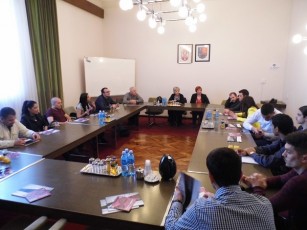
The law students' internship program is implemented according to the 2013 Collaboration Memorandum providing students with an opportunity to gain new and apply already acquired theoretical knowledge from the Public Administration subject taught at the Public Law Department.
During their internship, the students will learn more about the authority and jurisdiction of the PPCO, as well as the legal framework of its operation. They will also have a chance to learn about the steps of the PPCO complaints handling proceedings and to experience everyday work of the executives with the clients. For the purpose of their studies, they will also analyze selected complaints the PPCO has already acted upon.






